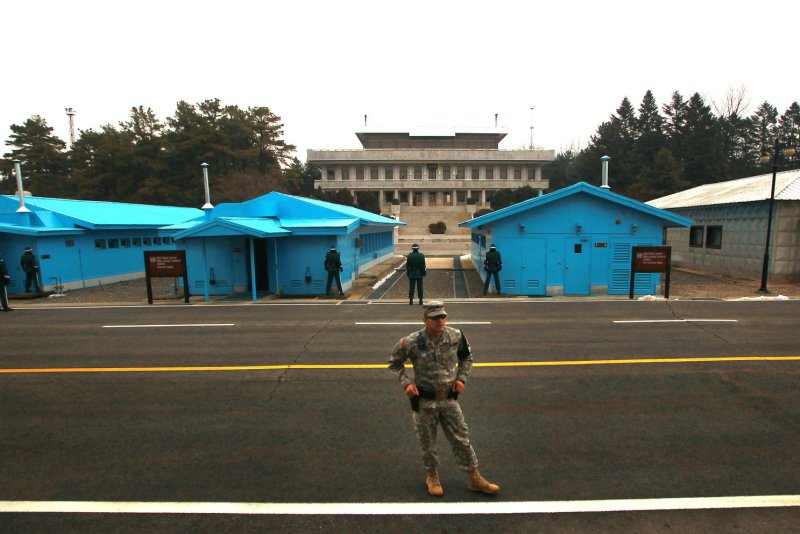A U.S. soldier stands watch with South Korean military police in front of the the southern side of the Joint Security Area's demarcation line separating South Korea from North Korea in the Korean demilitarized zone. A U.S. analyst said on Tuesday Seoul must be ready for the unexpected in all scenarios of Korean unification. File Photo by Stephen Shaver/UPI |
License Photo
LOS ANGELES, Nov. 4 (UPI) -- Korean unification would come with steep costs, but the cost of continued division could be higher, an analyst said during a conference near Los Angeles.
Bruce Bennett, a senior defense analyst at the RAND Corp., made the statement Tuesday while addressing South Korea's role in future unification scenarios, Yonhap reported.
Bennett said Seoul must be ready for unexpected outcomes: "Even in a peaceful Korean unification, some portion of the North Korea army will fight back. The United States and [South Korea] must prepare for that."
According to the analyst, unification could come about suddenly, as it was in the case of Germany. Bennett said that while the South Korean public is worried about the cost of unification, they must consider the cost of division. The cost of ongoing division could be higher than unification, he said.
Other analysts on the panel agreed that Seoul's preparation and prevention strategies are key to circumventing a humanitarian crisis.
Bruce Klingner, a senior fellow at the Heritage Foundation, said unification must occur through the absorption of North Korea into the South, and warned of massive infrastructure costs that could persist for decades. Klingner also said it would be difficult to anticipate a soft landing for Korean unification, given the current lack of cooperation from North Korean leader Kim Jong Un.
Professor David Kang, director of the University of Southern California's Korean Studies Institute, said differences exist between Korean unification scenarios and that of East and West Germany. Seoul would need to examine how to deal with refugees in unification's aftermath, Kang said.
"Korean unification need not result in a refugee crisis. Bringing supplies to North Korea may prevent one," Kang said.
The North Korean defector population in South Korea continues to climb, and in 2015 more than 500 North Koreans, mostly women, resettled in the South. Un-Chul Yang, vice president of South Korea's Sejong Institute, said the increasing number of disaffected elite defectors, leaving mid-level and even high-level ranks of the Pyongyang regime, are bringing uncertainty to Kim Jong Un. Many of those leaving are of high-status, or good family background, Yang said.















